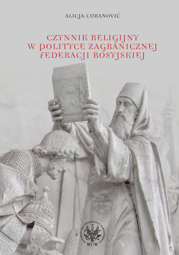Information about a product
| Date of realise: | Warszawa 2023 |
| Publication language: | polski |
| ISBN/ISSN: | 978-83-235-6150-7 |
| EAN: | 9788323561507 |
| Number of page: | 278 |
| Method of publication: | EPUB |
| Size of the file: | 1,73 MB |
| Publication type: | Praca naukowa |
| DOI: | https://doi.org/10.31338/uw.9788323561422 |
Rack Focuses. The Cinema in the Face of Political Transformations of 1945 and 1989
The book summarizes two moments of political breakthrough, which allows to look at Polish history in the 20th century not only from the perspective of violent transformations, but also long-lasting social, political and cultural narratives, reflected in Polish film productions, the organization of the film industry and the expectations the film audiences held of Polish cinema. The authors reflect on the narratives Polish filmmakers had to face, what elements of these narratives are present in Polish films which today prove both socio-political shocks and continuity and which form the complicated genealogy of the Third Polish Republic. The texts addressing this issue in German, Russian and Czechoslovakian cinema allow for seeing both transformations in Polish cinema in the transnational context.
Keywords: cinema, political transformations, the 20th century, Polish cinema, film studies.
The book summarizes two moments of political breakthrough, which allows to look at Polish history in the 20th century not only from the perspective of violent transformations, but also long-lasting social, political and cultural narratives, reflected in Polish film productions, the organization of the film industry and the expectations the film audiences held of Polish cinema. The authors reflect on the narratives Polish filmmakers had to face, what elements of these narratives are present in Polish films which today prove both socio-political shocks and continuity and which form the complicated genealogy of the Third Polish Republic. The texts addressing this issue in German, Russian and Czechoslovakian cinema allow for seeing both transformations in Polish cinema in the transnational context.
Keywords: cinema, political transformations, the 20th century, Polish cinema, film studies.
Marta Brzezińska-Pająk, https://orcid.org/0000-0003-2056-1078
Autem z papieru w nowe czasy. Symbolika trabanta w kontekście przełomu 1989 roku w filmie niemieckim (na wybranych przykładach)
https://doi.org/10.31338/uw.9788323561422.pp.213-230
Piotr Śmiałowski, https://orcid.org/0000-0002-6144-8699
Budowanie nowej władzy w scenariuszach i prozie Aleksandra Ścibora-Rylskiego
https://doi.org/10.31338/uw.9788323561422.pp.13-40
Jerzy Stachowicz, https://orcid.org/0000-0001-9179-128X
Cyfrowa maszyna zmian i Pan Kleks. Obrazy komputerów na polskim ekranie w dobie transformacji
https://doi.org/10.31338/uw.9788323561422.pp.101-120
Michał Piepiórka, https://orcid.org/0000-0003-2523-7656
Dorosłe dzieci mają żal. Obrazy lat 90. w polskim kinie najnowszym (2014–2021)
https://doi.org/10.31338/uw.9788323561422.pp.231-258
Paulina Gorlewska, https://orcid.org/0000-0003-3892-2644
Kolegą moim bądź. Od „czarnuchy” do melodramatu, czyli ekscesy transformacji we wczesnych filmach Władysława Pasikowskiego
https://doi.org/10.31338/uw.9788323561422.pp.179-198
Piotr Pławuszewski, https://orcid.org/0000-0002-1091-7010
Król i śmieci. O filmie dokumentalnym Autoportret (1993) Marcela Łozińskiego
https://doi.org/10.31338/uw.9788323561422.pp.161-178
Emil Sowiński, https://orcid.org/0000-0002-9453-7989
Młodzi i film? Instytucjonalne uwarunkowania debiutów okresu transformacji
https://doi.org/10.31338/uw.9788323561422.pp.135-160
Tomáš Hučko, https://orcid.org/0000-0001-6072-5925
Nacjonalizacja kinematografii czechosłowackiej w poglądach i działaniach filmowców Otakara Vávry i Elmara Klosa
https://doi.org/10.31338/uw.9788323561422.pp.65-100
Jędrzej Kościński, https://orcid.org/0000-0003-3147-3751
Przełom łagodny. Twórczość Stanisława Urbanowicza
https://doi.org/10.31338/uw.9788323561422.pp.41-64
Denis Viren, https://orcid.org/0000-0002-3680-6028
Spojrzenie na komunistyczną przeszłość w rosyjskim kinie lat 90.
https://doi.org/10.31338/uw.9788323561422.pp.199-212
Grzegorz Fortuna, https://orcid.org/
Zmiana nośnika. Sytuacja polskich kin i dystrybucji filmowej w okresie transformacji
https://doi.org/10.31338/uw.9788323561422.pp.121-134
Autem z papieru w nowe czasy. Symbolika trabanta w kontekście przełomu 1989 roku w filmie niemieckim (na wybranych przykładach)
https://doi.org/10.31338/uw.9788323561422.pp.213-230
Piotr Śmiałowski, https://orcid.org/0000-0002-6144-8699
Budowanie nowej władzy w scenariuszach i prozie Aleksandra Ścibora-Rylskiego
https://doi.org/10.31338/uw.9788323561422.pp.13-40
Jerzy Stachowicz, https://orcid.org/0000-0001-9179-128X
Cyfrowa maszyna zmian i Pan Kleks. Obrazy komputerów na polskim ekranie w dobie transformacji
https://doi.org/10.31338/uw.9788323561422.pp.101-120
Michał Piepiórka, https://orcid.org/0000-0003-2523-7656
Dorosłe dzieci mają żal. Obrazy lat 90. w polskim kinie najnowszym (2014–2021)
https://doi.org/10.31338/uw.9788323561422.pp.231-258
Paulina Gorlewska, https://orcid.org/0000-0003-3892-2644
Kolegą moim bądź. Od „czarnuchy” do melodramatu, czyli ekscesy transformacji we wczesnych filmach Władysława Pasikowskiego
https://doi.org/10.31338/uw.9788323561422.pp.179-198
Piotr Pławuszewski, https://orcid.org/0000-0002-1091-7010
Król i śmieci. O filmie dokumentalnym Autoportret (1993) Marcela Łozińskiego
https://doi.org/10.31338/uw.9788323561422.pp.161-178
Emil Sowiński, https://orcid.org/0000-0002-9453-7989
Młodzi i film? Instytucjonalne uwarunkowania debiutów okresu transformacji
https://doi.org/10.31338/uw.9788323561422.pp.135-160
Tomáš Hučko, https://orcid.org/0000-0001-6072-5925
Nacjonalizacja kinematografii czechosłowackiej w poglądach i działaniach filmowców Otakara Vávry i Elmara Klosa
https://doi.org/10.31338/uw.9788323561422.pp.65-100
Jędrzej Kościński, https://orcid.org/0000-0003-3147-3751
Przełom łagodny. Twórczość Stanisława Urbanowicza
https://doi.org/10.31338/uw.9788323561422.pp.41-64
Denis Viren, https://orcid.org/0000-0002-3680-6028
Spojrzenie na komunistyczną przeszłość w rosyjskim kinie lat 90.
https://doi.org/10.31338/uw.9788323561422.pp.199-212
Grzegorz Fortuna, https://orcid.org/
Zmiana nośnika. Sytuacja polskich kin i dystrybucji filmowej w okresie transformacji
https://doi.org/10.31338/uw.9788323561422.pp.121-134
Zobacz również

Update Required
To play the media you will need to either update your browser to a recent version or update your Flash plugin.











